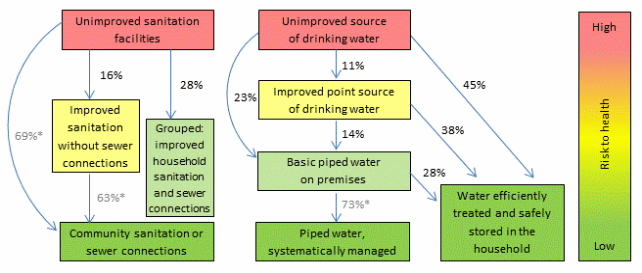Every 20 seconds, a child dies as a result of poor sanitation. Is that actually true and do we really need to prove that water and sanitation interventions have a health impact?
Published on: 17/06/2014
Every 20 seconds, a child dies as a result of poor sanitation. For every $1 invested in water and sanitation, $4 is returned in economic returns (Hutton, 2012). The WASH sector loves to use “facts” like these in advocacy messages but how reliable is the data behind them?
It is difficult to escape the conclusion that the literature on the impact of water, sanitation and hygiene is unreliable in its entirety. Wolf-Peter Schmidt.
In a provocative editorial, Dr. Wolf-Peter Schmidt of the London School of Hygiene & Tropical Medicine says it is “difficult to escape the conclusion that the literature on the [health] impact of water, sanitation and hygiene is unreliable in its entirety” (Schmidt, 2014). Health impact studies usually fail to meet strict scientific criteria or have not been carried out at scale in settings where they are most needed.
When you extrapolate this “bad evidence” on the basis of vague definitions of improved and unimproved water and sanitation you won’t get meaningful statistics, Schmidt infers while pointing the finger at the influential Global Burden of Disease study (GBD).
Since Schmidt wrote his editorial, the World Health Organization (WHO) has published revised statistics for WASH. Their latest estimate is that 842,000 diarrhoea deaths are caused by poor water, sanitation and hygiene, which would account for 1.5% of the total disease burden and 58% of diarrhoeal diseases. In children under five years old, 361,000 deaths could be prevented according to WHO, representing 5.5% of deaths in that age group (Prüss-Ustun et al., 2014).
When we asked Woff-Peter Schmidt to comment on the latest WHO study, he said:
"The main problem with this review and analysis of the burden of disease attributable to poor water and sanitation are the same as as with previous attempts: the included studies have substantial methodological problems. The effect estimates are largely a summary of the almost inevitable bias and confounding present in most of the included studies. The review may have been politically necessary to counter the even more questionable estimates from the recent Global Burden of Disease Study. However, one should be under no illusion as to the validity of the findings. While water and sanitation are likely to fundamentally improve people's lives, wellbeing and health in poor settings, epidemiological research may not be the right tool to prove this."
Meanwhile the body of research on the health impact of WASH interventions continues to grow. Popular of late is research examining the links with nutrition, stunting and environmental enteropathy (Tropical sprue). The large-scale WASH Benefits Study, for instance, intends to measure the health impact of WASH and nutritional interventions among newborn infants in rural Bangladesh and Kenya. For recent overviews of other studies see the March 2014 WASHplus WASH/Nutrition Literature Update and the November 2013 WASHplus Weekly on the health impacts of WASH interventions.

Even if there is no conclusive evidence of health impact, Schmidt believes that “the educational, developmental and gender-related benefits of water and sanitation access are large enough to merit investment”. It’s unacceptable that children in slums should have to wade through open sewage or that school-aged girls should spend hours every morning fetching water. We don’t need academic research to tell us that.
References:
Hutton, G., 2012. Global costs and benefits of drinking-water supply and sanitation interventions to reach the MDG target and universal coverage. Geneva, Switzerland, World Health Organization. WHO/HSE/WSH/12.01. Available at: http://www.who.int/water_sanitation_health/publications/2012/global_costs/en/
Prüss-Ustun, A. et al., 2014. Burden of disease from inadequate water, sanitation and hygiene in low- and middle-income settings : a retrospective analysis of data from 145 countries. Tropical medicine & international health. DOI: 10.1111/tmi.12329
Schmidt, WP, 2014. The elusive effect of water and sanitation on the global burden of disease. Tropical medicine & international health, 19 (5), pp. 522–527. DOI: 10.1111/tmi.12286